Empirical research program
Aristotle is the earliest natural historian whose work has survived in some detail. Aristotle certainly did research on the natural history of Lesbos, and the surrounding seas and neighbouring areas. The works that reflect this research, such as History of Animals, Generation of Animals, and Parts of Animals, contain some observations and interpretations, along with sundry myths and mistakes. The most striking passages are about the sea-life visible from observation on Lesbos and available from the catches of fishermen. His observations on catfish, electric fish (Torpedo) and angler-fish are detailed, as is his writing on cephalopods, namely, Octopus, Sepia (cuttlefish) and the paper nautilus (Argonauta argo). His description of the hectocotyl arm was about two thousand years ahead of its time, and widely disbelieved until its rediscovery in the 19th century. He separated the aquatic mammals from fish, and knew that sharks and rays were part of the group he called Selachē (selachians).Another good example of his methods comes from the Generation of Animals in which Aristotle describes breaking open fertilized chicken eggs at intervals to observe when visible organs were generated.
He gave accurate descriptions of ruminants' four-chambered fore-stomachs, and of the ovoviviparous embryological development of the hound shark Mustelus mustelus.
Classification of living things
Aristotle's classification of living things contains some elements which still existed in the 19th century. What the modern zoologist would call vertebrates and invertebrates, Aristotle called 'animals with blood' and 'animals without blood' (he was not to know that complex invertebrates do make use of haemoglobin, but of a different kind from vertebrates). Animals with blood were divided into live-bearing (humans and mammals), and egg-bearing (birds and fish). Invertebrates ('animals without blood') are insects, crustacea (divided into non-shelled – cephalopods – and shelled) and testacea (molluscs). In some respects, this incomplete classification is better than that of Linnaeus, who crowded the invertebrata together into two groups, Insecta and Vermes (worms).For Charles Singer, "Nothing is more remarkable than [Aristotle's] efforts to [exhibit] the relationships of living things as a scala naturae"Aristotle's History of Animals classified organisms in relation to a hierarchical "Ladder of Life" (scala naturae), placing them according to complexity of structure and function so that higher organisms showed greater vitality and ability to move.
Aristotle believed that intellectual purposes, i.e., final causes, guided all natural processes. Such a teleological view gave Aristotle cause to justify his observed data as an expression of formal design. Noting that "no animal has, at the same time, both tusks and horns," and "a single-hooved animal with two horns I have never seen," Aristotle suggested that Nature, giving no animal both horns and tusks, was staving off vanity, and giving creatures faculties only to such a degree as they are necessary. Noting that ruminants had multiple stomachs and weak teeth, he supposed the first was to compensate for the latter, with Nature trying to preserve a type of balance.
In a similar fashion, Aristotle believed that creatures were arranged in a graded scale of perfection rising from plants on up to man, the scala naturae or Great Chain of Being.His system had eleven grades, arranged according "to the degree to which they are infected with potentiality", expressed in their form at birth. The highest animals laid warm and wet creatures alive, the lowest bore theirs cold, dry, and in thick eggs.
Aristotle also held that the level of a creature's perfection was reflected in its form, but not preordained by that form. Ideas like this, and his ideas about souls, are not regarded as science at all in modern times.
He placed emphasis on the type(s) of soul an organism possessed, asserting that plants possess a vegetative soul, responsible for reproduction and growth, animals a vegetative and a sensitive soul, responsible for mobility and sensation, and humans a vegetative, a sensitive, and a rational soul, capable of thought and reflection.
Aristotle, in contrast to earlier philosophers, but in accordance with the Egyptians, placed the rational soul in the heart, rather than the brain.Notable is Aristotle's division of sensation and thought, which generally went against previous philosophers, with the exception of Alcmaeon.
Successor: Theophrastus

Frontispiece to a 1644 version of the expanded and illustrated edition of Historia Plantarum (ca. 1200), which was originally written around 200 BC
Main articles: Theophrastus and Historia Plantarum
Aristotle's successor at the Lyceum, Theophrastus, wrote a series of books on botany—the History of Plants—which survived as the most important contribution of antiquity to botany, even into the Middle Ages. Many of Theophrastus' names survive into modern times, such as carpos for fruit, and pericarpion for seed vessel.Rather than focus on formal causes, as Aristotle did, Theophrastus suggested a mechanistic scheme, drawing analogies between natural and artificial processes, and relying on Aristotle's concept of the efficient cause. Theophrastus also recognized the role of sex in the reproduction of some higher plants, though this last discovery was lost in later ages.
Influence on Hellenistic medicine
For more details on this topic, see Medicine in ancient Greece.
After Theophrastus, the Lyceum failed to produce any original work. Though interest in Aristotle's ideas survived, they were generally taken unquestioningly. It is not until the age of Alexandria under the Ptolemies that advances in biology can be again found.The first medical teacher at Alexandria, Herophilus of Chalcedon, corrected Aristotle, placing intelligence in the brain, and connected the nervous system to motion and sensation. Herophilus also distinguished between veins and arteries, noting that the latter pulse while the former do not.Though a few ancient atomists such as Lucretius challenged the teleological viewpoint of Aristotelian ideas about life, teleology (and after the rise of Christianity, natural theology) would remain central to biological thought essentially until the 18th and 19th centuries. Ernst Mayr claimed that there was "nothing of any real consequence in biology after Lucretius and Galen until the Renaissance."Aristotle's ideas of natural history and medicine survived, but they were generally taken unquestioningly.



0 comments:
Post a Comment